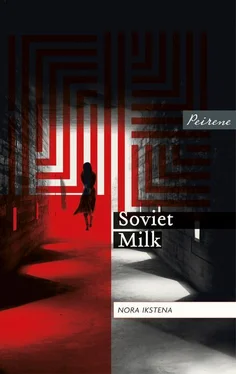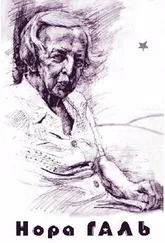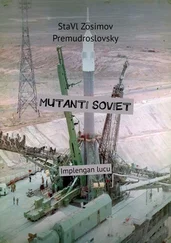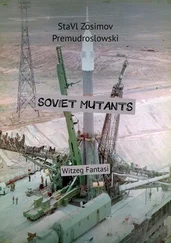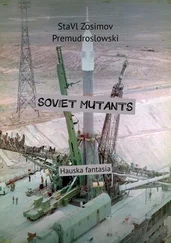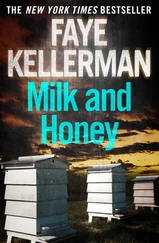My mother had almost regained her spirits. She dug out a small crimson bow tie. I thought only boys could wear bow ties, but my mother said that this would makemy graduation outfit particularly chic. And she was right. At the graduation neither my male nor my female school friends had bow ties; everyone was talking about it.
My grandmother and my step-grandfather brought gifts and flowers. They sat beside my mother in the hall. I had the best report card in the school. After the formal ceremony there was some free time before the evening’s dancing. My mother invited my grandparents to come back to our house. This was the first time they had visited us.
My step-grandfather walked around the garden, the dog following his every step, because he had been used only to women. I led my grandmother into my room. She sat down at my desk and gazed out of the window. Once more I saw tears fill her eyes.
‘Stop, please! It’s a celebration today. And in the autumn I’m coming to stay with you.’
My mother had set a table in the garden with simple refreshments. The apple trees were still in blossom. The white blossoms fell on the table and into the lemonade.
‘We haven’t had a bad life here,’ my mother said. ‘We’ll see how I do on my own.’
My grandmother and my step-grandfather kept quiet.
‘What are all these funeral speeches!’ I exclaimed, and kissed them, one after the other. It was spring. I might be in love and had high expectations for the evening dance.
In the midst of my happiness, the inscription from my mother’s photo album slipped out: ‘As you grow, may your spirit grow in clarity.’
My mother gave us a look so full of sadness that I grew ashamed of my coltish joy.
‘It’s probably time for you to go to the railway station,’ she told my grandparents. ‘For you too. Keep them company. Then you’ll have to go straight to the dance.’
Why did she always make everything so gloomy? On the way to the railway station I burst into tears. How can one keep on not wanting to live? Even on my graduation day not wanting to, probably also the day I was born not wanting to. ‘You saved her from the claws of death. How can she repay you like that?’ I said to my grandmother and step-grandfather, who walked beside me in silence. My step-grandfather stopped now and then, to catch his breath. My grandmother took his bag.
In the station we hugged.
‘You won’t die, will you?’ I said – just as I had as a child.
‘We won’t die, Sweet Pea, we won’t die.’
That evening I didn’t want to see my mother again. I walked as far as the river and back again to the softly lit community hall, where the dancing was beginning.
I had a feeling he would ask me to dance a slow number with him. ‘I Just Called to Say I Love You’ crooned from the speakers, and the school’s naughtiest and most attractive boy was heading diagonally across the hall towards me. In the beginning we danced a bit apart from each other. I placed my hands on his shoulders and he somewhat fearfully put his around my waist. But it was such a good feeling that we moved closer to each other. I tried not to be taller than him. He touched my neck with his nose. The hall’s parquet floor disappeared beneath my feet.
In the warm June night we walked to the river. He gathered small flat stones and flipped them across the water. The stones touched the surface of the water several times, flew the next bit of distance, then sank.
At our house he first kissed me on the cheek, then pressed his lips to mine, which I held tightly pinched together. This was my first kiss.
I carefully opened the front door so as not to wake my mother. Her door was open and her room was empty. Through the open window I saw her cigarette glowing faintly in the garden. She was sitting by our festive table, which was still laden with plates and lemonade glasses.
‘Mamma, why are you sitting here alone in the dark?’ I asked her, stepping out into the garden.
‘I’m afraid, my child. I’m afraid,’ she whispered.
She had never called me that before. And she had never talked of fear.
My anger with her dissipated into the warm night.
I hugged my mother tightly. ‘Mamma, don’t be afraid. You just need to want to live, Mamma. You need to want to live and all will be fine. I love you, Mamma.’
*
It was a sun-drenched summer. Although my mother and stepfather had invited my daughter to come with them to the seaside for a month, she decided to stay with me until mid-August. Everything this summer seemed to play a part in our farewells. Our dog died, probably from eating rat poison. We buried him beside Bambi.
I avoided going into my daughter’s room, where everything was gradually being packed for her departure. On her desk stood a daily flip calendar: the summer of 1984 was being turned over, page by page.
Jesse became a frequent visitor. She arrived to help, to tidy, to prepare this and that. The ambulatory centre was closed for a month, so Jesse, who was working part-time in the book archives at the church, slipped me a few things to read, to shorten my long, sleepless nights.
Jesse also told me about books whose covers were torn, so as to obscure their authors and titles, and cut into pieces to be fed to a shredding machine. About books stacked in lorries and driven away into the unknown.
One evening Jesse brought me a section of a book which had drawn her attention because of its special paper and type. It was in Latvian but looked nothing like the thin, grey-paper products of our publishing houses.
‘A section of a book is also a book,’ said Jesse, proud of her find.
I flipped through the pages aimlessly. Then I chanced upon a dialogue which sent shivers down my spine.
‘Do you believe in God, Winston?’
‘No.’
‘Then what is it, this principle that will defeat us?’
‘I don’t know. The spirit of Man.’
Who was this Winston who was asked about God just as I’d been asked on Engels Street before going to Leningrad?
I read on. The whole dialogue sounded as if the speaker was standing right beside me, in my narrow room, as if he was describing my life right now.
*
We could have had a lovely last summer together, if Jesse had not brought us that portion of book. My mother devoured it, and Jesse and I counted the days until the ambulatory centre would reopen. Jesse regretted her find from the bottom of her heart. We even debated taking the book away from my mother, but the consequences would have been unpredictable. In the beautiful light summer evenings in the garden my mother talked only about her ‘book of revelation’, which Jesse had rescued from the archives.
I began to go out in the evenings, leaving my mother with Jesse. Jesse sat faithfully beside her in the garden and listened to endless tirades about Winston, this new stranger who had completely overshadowed Ishmael.
With frequent turning and consultation, the pages of this half-book began to disintegrate. Looking for sturdier paper, my mother eventually took our calendar and wrapped the book in that. The inscription on it in red said ‘Novij 1984 god’ – ‘New Year 1984’. She crossed this out and wrote in black ballpoint: ‘Summer 1984.’
I hated this half-book wrapped in a calendar. It had stolen my last summer with my mother and led her even further into a fantasy world, away from life, the blooming garden and the balmy river.
*
I floated through my daughter’s departure as if wrapped in mist. My daily reality had blended with Jesse’s book. My life no longer felt as though it was mine. July and half of August sped by at savage speed. Eventually Jesse took the book away and hid it somewhere. She could no longer look on as I ruined my last few days with my daughter. I admired my daughter. She didn’t show her disappointment and patiently tolerated my odd absence, while carefully packing the things she would be taking to Riga. She had found a part-time job at the post office, to earn some pocket money, and in the evenings she wasn’t home, but she never came back later than midnight. Maybe she was in love? There was no time for her to tell me about it. Jesse found this the most painful thing. The day she took the book from me, she said that I was behaving like her mother, who had left her on the orphanage steps with the note: ‘I don’t want this gift.’
Читать дальше
